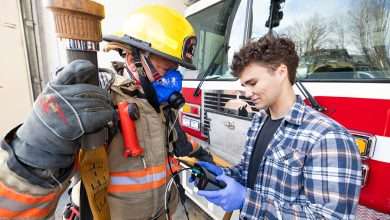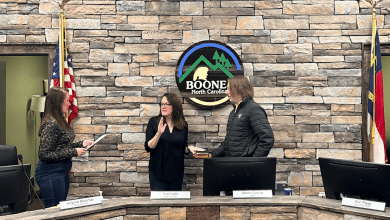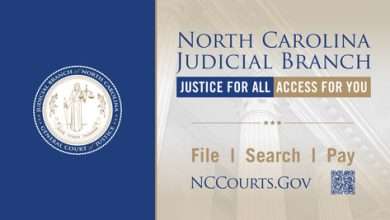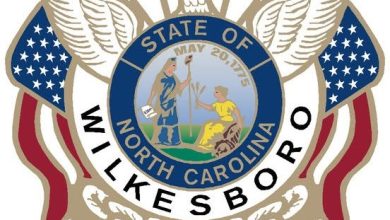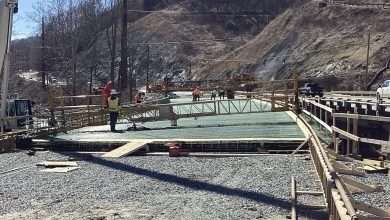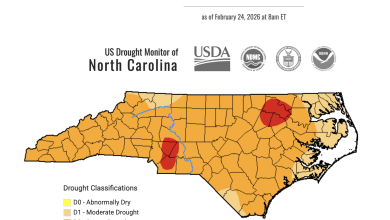Last Updated on February 12, 2022 6:43 pm
By Megan Hayes/Appalachian State Communications
BOONE, N.C. — With confidence increasing for the Boone area to experience significant heavy rainfall, flooding and damaging winds, Appalachian State University continues encouraging preparation while monitoring the Florence storm track.
The university canceled classes and academic obligations for Monday, Sept. 17, and Tuesday, Sept. 18. A message to campus posted on the university’s emergency alert website stated, “the safety of students, faculty and staff traveling to campus is paramount.” For non-faculty employees, Adverse Weather Policy is in effect at Condition 1 (Reduced Operations) Monday and Tuesday. Further decisions about employee status will be made by 5 p.m. Sunday. Keep up with the latest information at AppStateAlert.com.
“Please know the forecast is still developing, but we are encouraging continued preparation,” Director of Environmental Health, Safety and Emergency Management Jason Marshburn said in a message to campus Saturday afternoon. “We will provide regular updates as we learn more about the storm track and what this will mean for our campus, our off-campus students, faculty and staff, and the surrounding area.”
“In accordance with established emergency readiness plans, the university continues to prepare,” Marshburn said. He cited a number of preparations, including checking and clearing roof and storm drains; extra supplies, including food, water, sandbags and gravel on hand and in place; and putting personnel in place to stay on campus and on call during storm. Additionally, Marshburn said, “The university is coordinating with local and state partners in the event emergency response plans need to be implemented.”
Marshburn emphasized that residence halls and dining facilities will remain open. Residence halls are being carefully monitored and dining facilities have stocked up on extra food and water, he said.
Additionally, the university set up a temporary shelter for off-campus students, faculty and staff in need of safe shelter. The Quinn Center, located at 303 Stadium Drive, will open at 5 p.m. on Saturday, Sept. 15.
Marshburn encouraged those planning to attend campus events to check event websites and with presenters, as many previously scheduled campus events have been postponed or canceled.
During the time that classes are canceled, gates to restricted parking areas on campus are lifted and students, faculty, staff and the public can park in those lots.
As some parking lots on campus are prone to flooding, Marshburn advises to always be mindful of signage. “As inclement weather develops, parking and traffic staff are posting warning signs in lots prone to flooding,” he said, citing in particular:
- Beasley Broadcasting Complex
- Depot Street Gravel Lot
- Peacock Lot
- Duncan Lot
- Center Street (spaces between Steam Plant and tennis courts)
- Legends Lot
- State Farm Lot
- Levine Hall Lot
All lots will be monitored and signs may be posted in additional lots if necessary, Marshburn said.
Marshburn said it is unlikely campus will lose power, but he encourages those staying on and off campus to prepare in the event of a power outage. “Make sure your phone is charged and you have batteries on hand in case you need them,” he said.
New River Light & Power (NRLP), which serves much of the Boone area, is making preparations to help and/or receive assistance from other utilities across the state. They will be updating their social media sites (Facebook, Twitter and Instagram). NRLP customers with questions related to electric service or who need to report an outage should call 828-264-3671.
Key messages to campus from Marshburn’s message include:
What you should do
Prepare and plan
- Discuss with your family and significant other: if you had to evacuate from your home, where would you go and how would you get there?
- Make sure you have more than one way to communicate.
- Charge your phones and essential electronics.
- Fill up water bottles from your sink — you don’t have to buy bottled water.
- Consider where you have parked your car. On campus, some lots are prone to flooding.
- Stay calm, and have a plan — it’s always good to have a readiness kit.
Be safe
- Our biggest concern is rain. Heavy rainfall can bring with it the potential for landslides and flooding.
- Unless absolutely necessary, don’t drive in severe weather.
- NEVER drive through flooded streets or around barricades — they are there to protect people from danger.
- Fast-moving water, even if it is pretty shallow, is dangerous. It takes only 6 inches of fast-moving water to knock over an adult. 12 inches of rushing water can carry away a small car, and 2 feet can carry away most vehicles.
- Tornadoes aren’t common in this area, but there is a small chance we might see some. Be sure you know how you would get alerts at night.
- Resist the urge to throw large objects into storm drains and fast-moving water. This causes flooding hazards and is unsafe for maintenance workers who are trying to keep drains clear of obstructions.
Stay informed
- Stay alert for messages that will be sent to you via your appstate email.
- Register for text alerts at http://appstatealert.com.
- Messages related to class closings and cancellations are emailed, posted to appstatealert.com, distributed to local media and posted to university Facebook and Twitter accounts.
- Use reliable sources — monitor AppStateAlert.com and appstate email addresses for important university updates. Watauga County Emergency Management and Boone Police have official social media accounts — be sure you know where your information is coming from.
- Visit ReadyNC.org and/or download the ReadyNC mobile app for helpful tips and safety information.
- Visit National Weather Service or National Hurricane Center websites for weather forecast and safety information.








